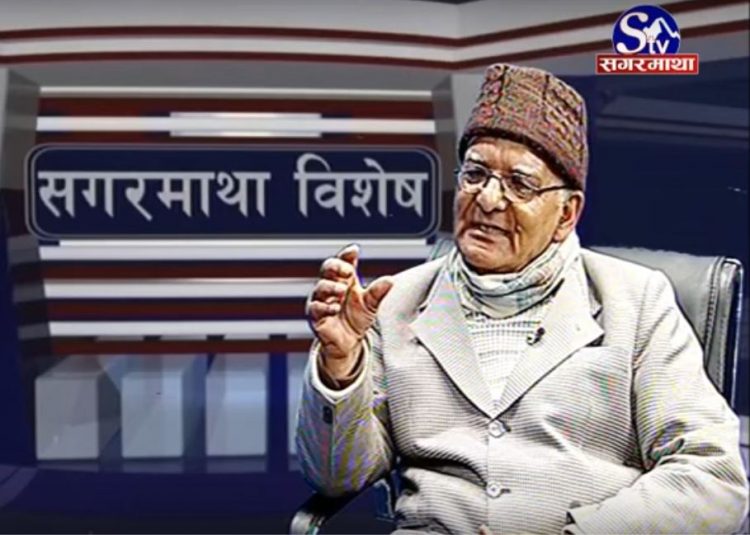Hindi also will be a language of official business if amendment bill is passed in current form
Sujit Mainali / January 13, 2017

Rastriya Janamorcha Chairman Chitra Bahadur KC. Photo: Youtube.com/SagarmathaTV
In an interview aired on Sagarmatha TV on January 10, Rastriya Janamorcha Chairman Chitra Bahadur KC made the following statement about the amendment bill tabled by the government in parliament:
“How can a bill that proposes allowing naturalized citizens to become the head of state, or the head of government be registered [in parliament]? And how can they propose making Hindi as a national language and a language of official business in a country where 123 languages are spoken?”
To see whether this statement is fact-based or not, South Asia Check has examined the authenticity of the following two claims:
First claim: The amendment bill registered by the government in parliament proposes allowing a naturalized citizen to become the head of state or the head of government.
Second claim: The amendment bill proposes allowing Hindi to become a language of official business of Nepal.
First claim: The amendment bill registered by the government in parliament proposes allowing a naturalized citizen to become the head of state or the head of government.
The amendment bill tabled by the government in parliament proposes amending four provisions (language, eligibility for naturalization through matrimony, the formation of the National Assembly and the change in the delineation of Province 4, Province 5 and Province 6) of the Constitution of Nepal.
Therefore, Chairman KC’s claim that the bill proposes allowing naturalized citizens to become the head of state or the head of government is wrong.
Second claim: The amendment bill proposes allowing Hindi to become a language of official business of Nepal.
The amendment bill proposes amending three articles (Article 6, Article 7 and Article 287) related to language.
Article 6 of the Constitution states that “all languages spoken as the mother tongues in Nepal are the languages of the nation”. The amendment bill has proposed adding the following phrase at the end of Article 6 – “As per the recommendation of the Language Commission, the Government of Nepal will insert all the mother tongues in the annex of the constitution.”
If this article is amended as proposed, Hindi also will be inserted in the annex of the Constitution by virtue of Hindi being the mother tongue of 0.29 percent population of Nepal. (See “National Population and Housing Census 2011, Caste/Ethnicity and Language”)
The amendment bill has also proposed amending Article 7 of the Constitution relating to the languages of official business.
Article 7(1) states that “the Nepali language written in the Devanagari script shall be the language of official business in Nepal.” Similarly, Article 7(2) states that “A State may, by a State law, determine one or more than one languages of the nation spoken by a majority of people within the State as its official language(s), in addition to the Nepali language.”
These two provisions have barred Hindi from getting the status of a language of official business, both at the national and the provincial levels, as Hindi is the mother tongue of only 77,569 people in Nepal.
The amendment bill has proposed adding a sub clause, Article 7(2A), by adding the following phrase in the existing Article 7(2), “As per the suggestion of the Language Commission, Government of Nepal will insert the languages decided as the languages of official transaction in the annex of the Constitution.”
According to this phrase, the languages of official business will be decided by the government as per the recommendation of the Language Commission and those languages will be inserted in the annex of the constitution.
Similarly, the amendment bill has also proposed amending Article 287 of the Constitution. This Article is about the Language Commission.
Clause 6 of this Article mentions the ‘The functions, duties and powers of the Language Commission”. Clause 6(A) states that the functions, duties and powers of the Language Commission shall be “to determine the criteria to be fulfilled for the recognition of the official language and make recommendations on languages to the
Government of Nepal…”
The amendment bill has proposed adding Clause 6(A1) which states that the functions, duties and powers of the Language Commission shall be “to prepare a list of all the mother tongues spoken in Nepal in accordance with Article 6 and recommend the list to the Government of Nepal”.
According to this provision, the Language Commission will have to recommend the Government of Nepal to make all the languages listed in the annex of the Constitution in accordance with the amended Article 6 as “the languages of official business”.
If the amendment bill in the current form is endorsed by parliament, Hindi also will be listed as a mother tongue in the annex of the Constitution, and the Language Commission will recommend the Government of Nepal to make Hindi along with other mother tongues as the languages of official business.
Although the amendment bill has not explicitly mentioned that Hindi also will be made a language of official business, if the amendment is endorsed in the existing form, Hindi will be a language of official business of Nepal.
Therefore, Chairman KC rightly said the amendment bill proposes allowing Hindi to become a language of official business of Nepal.
This material is copyrighted but may be used for any purpose by giving due credit to southasiacheck.org.
Comments
Latest Stories
- In Public Interest Covid-19 cases are low, but that’s not an excuse to avoid vaccination
- In Public Interest What is BF.7, the sub-variant that has the world by its grip?
- In Public Interest Threat of a new Covid-19 wave looms large amid vaccine shortage in Nepal
- In Public Interest As cases decline, Covid-19 test centres in Kathmandu are desolate lot
- In Public Interest Dengue test fee disparity has patients wondering if they’re being cheated
- In Public Interest As dengue rages on, confusion galore about what it is and what its symptoms are. Here’s what you need to know
In Public Interest
 Covid-19 cases are low, but that’s not an excuse to avoid vaccination
The Pfizer-BioNTech bivalent vaccines authorised by the Nepal Government provide better protection a...
Read More
Covid-19 cases are low, but that’s not an excuse to avoid vaccination
The Pfizer-BioNTech bivalent vaccines authorised by the Nepal Government provide better protection a...
Read More
- What is BF.7, the sub-variant that has the world by its grip?
- Threat of a new Covid-19 wave looms large amid vaccine shortage in Nepal
- As cases decline, Covid-19 test centres in Kathmandu are desolate lot
- Dengue test fee disparity has patients wondering if they’re being cheated
- As dengue rages on, confusion galore about what it is and what its symptoms are. Here’s what you need to know